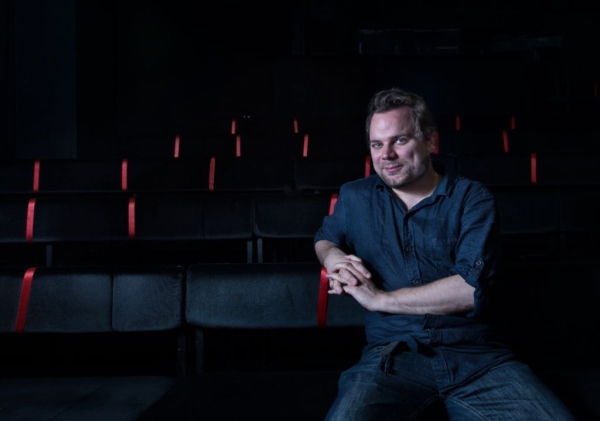The Gate's Christopher Haydon: 'We want to create work that looks at massive ideas'
The artistic director of the Gate Theatre on the theatre’s history, its 35th anniversary and his attitude to programming

"What’s great about the Gate’s board is that they let each artistic director reinvent the theatre in their own image," says current artistic director Christopher Haydon. "So within that internationalism you’re then encouraged strongly to absolutely give it your own stamp and feel free to break away from your predecessors and do something new."
For Haydon, the Gate is all about big ideas. That’s at the level of the work the theatre presents, the artists that it supports, and the political debates that it engages in. He explains that his way of interpreting the theatre’s international focus is to programme work that is "primarily international in its focus rather than necessarily its origin" – although the Gate continues to present international plays, particularly from the US. "We want to create work that looks at massive ideas and big issues that operate at an international level," Haydon adds.
Another aspect of the Gate’s history that Haydon is keen to continue is its support of young artists, many of whom go on to have extraordinarily successful careers. The Gate has an impressive roll call of alumni; former artistic directors include Stephen Daldry, Erica Whyman and Carrie Cracknell, while the likes of Rupert Goold, Katie Mitchell, Lyndsey Turner and incoming National Theatre artistic director Rufus Norris all worked at the theatre early in their careers. Haydon suggests that the Gate’s audiences enjoy knowing that they are witnessing the talent of the future – "there’s something exciting about being there at the beginning," he says.
Again, Haydon places the focus on big ideas. Experimentation is an important part of his ethos and he sees the Gate as "a place for emerging practitioners to really try stuff out, to explore things that they’ve not been able to do in any other context". With limited resources, the Gate is always seeking out theatre-makers "who have something to say" and offering them as much support as possible.
"Instead of spreading ourselves thinly and maybe commissioning ten different artists by giving them a few thousand quid to begin making something, I would much rather commission one artist and give them a production budget of 40,000 quid to make a full show," Haydon explains. "So our philosophy is always very much about focusing our resources on the few people that we really, really believe in and giving them the absolute maximum level of support that we can."
Despite Haydon’s attraction to ambitious intellectual concepts when programming, he stresses that the work also has to be theatrically exciting. "The worst thing in the world is to watch a piece of work that is a sort of disguised lecture, or just a really dry, cerebral experience," he says, adding that he is looking for shows that have "a genuine, visceral, emotional connection and a real theatricality". He offers the example of Ellen McDougall‘s production of Idomeneus, which married the examination of complex, knotty ideas with a playful – and gloriously messy – performance aesthetic.
The same goes for the way in which the theatre pursues its political purpose. "You make bad work if the work you’re doing is led by a particular argument," says Haydon. "I’ve read plays about how awful the Tories are and generally they’re bad, because the writer isn’t actually writing a play, they’re writing an argument and using dialogue as a way of expressing that. That makes for bad art."
"You make bad work if the work you’re doing is led by a particular argument"
Instead, Haydon believes that the best way for theatre to resist a government which is "pushing through an austerity plan which is overwhelmingly ideological" is to put narratives on stage that interrogate the world in all its complexity.
"If you’re going to hold power, you have to win arguments, and you win arguments by boiling them down to their simplest points and often by appealing to people’s self-interest or appealing to people’s baser instincts, and if you’re good at that then you have power. What an artistic response to that has to be is to refuse to allow the wider argument, the wider dialogue in society, to be reduced to that kind of simplistic, basic, self-interested narrative."
Haydon is also wary of theatre becoming "myopic" about the present political situation and fighting austerity only at the level of arts cuts. "I don’t really believe, if there are going to be cuts, that the arts should be made a special case and the disability living allowance and welfare shouldn’t be," he says. "So you do have to fight the cuts to the arts, absolutely, but you have to fight it as part of a wider resistance to an ideologically imposed series of spending cuts which the Tories are pushing through because they are opposed to public funding."
In line with Haydon’s stance on political theatre, the three plays in the 35th anniversary season, titled ‘Who Does She Think She Is?’, are not always explicitly political, but instead engage with the complexities of the modern world. Adam Rapp‘s The Edge of Our Bodies, which Haydon describes as a "sort of female version of 'The Catcher in the Rye''", is a play that the artistic director read a couple of years ago and couldn’t shake from his mind. "It’s really poetic and really beautiful," Haydon says. "I find the character very mysterious; she’s incredibly strong and very vulnerable, she’s very young and very old at the same time. She has all of those complexities and paradoxes that draw me to any character."
The Edge of Our Bodies is joined by Chimera, which is "about a woman who discovers that she has two sets of DNA in her body, which is a real medical condition, and has this brilliantly theatrically presented complete crisis of identity and breakdown as a result; it’s a really extraordinary piece of performance". The final play of the season is The Chronicles of Kalki, a play by Aditi Brennan Kapil "about a girl who may or may not be the tenth incarnation of Vishnu". Haydon adds that "they’re very different shows, but they’re all looking at identity in some way".
The other thing that these three plays have in common is their focus on strong female characters, something which is particularly important for Haydon. "I’ve always been very drawn to strong female protagonists," he says. "When I was a kid I used to love The Worst Witch, when I was a student it was Buffy the Vampire Slayer and Ripley in Aliens, and then when I was making work I was drawn to plays like The Trojan Women and Grounded."
Haydon resists, however, describing the season as feminist. This is not down to any desire to shy away from the F word – "I would absolutely describe myself as a feminist," he insists – but is rather born from not wanting to suggest that there is anything unusual about putting strong female voices on stage. "My feeling about not explicitly saying this is a feminist season is that I think the risk is that you end up implying that any play that has a woman as its central role is therefore feminist," Haydon explains. "And actually that still puts a cage or a glass box around those stories. We need to fundamentally subvert this idea that the white male is the default."
He suggests that "the best way to stop it being unusual is just to make it usual and not draw attention to it". He also believes that, as an artistic director, "with one hand you can be banging a drum, and with another hand you can be embodying the principle in a more indirect way". For the Gate, this is about representing the widest range of stories possible on stage at the same time as widening access beyond the stage. Haydon talks about taking a different approach to recruitment, rethinking the vocabulary that they use as an organisation, and helping with childcare solutions for artists with children.
"I’m far from an expert on all of this, but it’s something that’s a very steep and very exciting learning curve at the moment," says Haydon. "At every level it makes your organisation better: if you’re pulling from a wider group of people you’re going to get better people; if you’ve got people from a much wider set of backgrounds than just posh universities then you’re going to get a wider set of perspectives."
This all informs the Gate’s approach as it marks its 35th anniversary. Although details of the theatre’s other anniversary celebrations are still under wraps, Haydon tells me that they will be bringing back several Gate alumni to hold masterclasses and participate in public discussions that place the theatre’s current shows within the context of its history. But ultimately, as far as Haydon is concerned, celebrating the theatre is about making the best work possible, be that an ambitious new programme or the forthcoming national tour of the Gate’s acclaimed production of Grounded.
"We're being as ambitious as we possibly can at the moment to create as much work as we can and to give that work as wide an audience as possible," he says. "That’s really how you celebrate the theatre."













